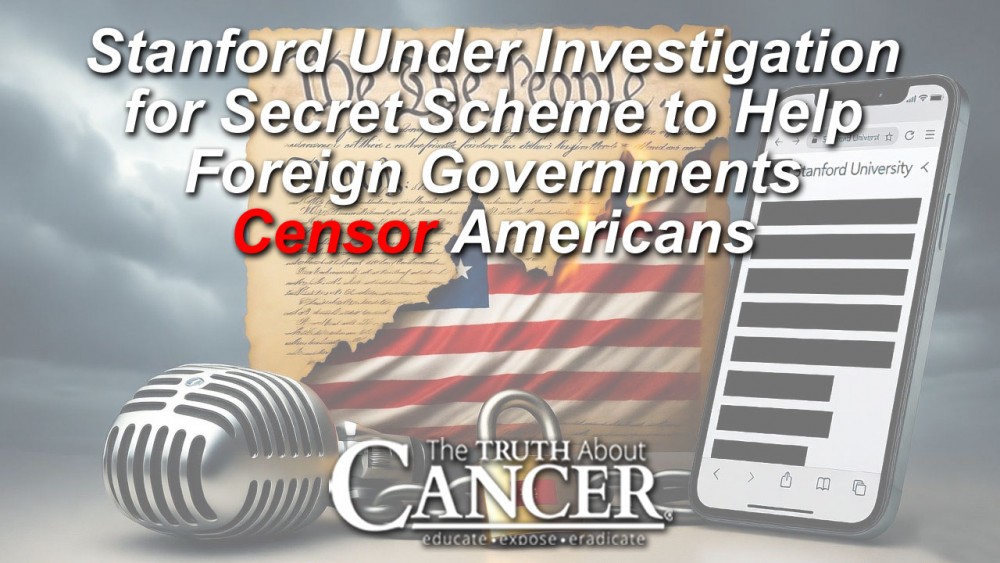Originally published in THE DEFENDER
Stanford University is the target of a new congressional investigation into how the institution and its Cyber Policy Center may be working with nongovernmental organizations (NGOs) and foreign governments to censor Americans’ speech, investigative journalist Michael Shellenberger reported Wednesday.
Rep. Jim Jordan (R-Ohio), chairman of the U.S. House of Representatives Judiciary Committee, is heading up the investigation. In an Oct. 22 letter, Jordan asked the center’s director to provide documents relating to a “foreign censorship scheme” and a roundtable held last month that “brought together foreign officials who have directly targeted American speech.”
According to Jordan, the roundtable’s keynote speaker was Julie Inman-Grant, “the Australian eSafety Commissioner who has explicitly argued that governments have the authority to demand and enforce global takedowns of content.”
Stanford did not publicize the roundtable, which “was secret and only discovered thanks to a whistleblower who provided Jordan’s investigators with the agenda,” Shellenberger reported. Participants included representatives of the European Union (EU) and the governments of the United Kingdom (U.K.), Australia and Brazil.
“By hosting this event, designed to encourage and facilitate censorship compliance with regulators from Australia, Brazil, the EU, and the UK, Stanford is working with foreign censorship officials to vitiate the First Amendment,” Jordan alleged in his letter.
According to Shellenberger, in 2023, the Cyber Policy Center was “caught covering up and lying” about its work with the U.S. Department of Homeland Security under the Biden administration, to censor Americans’ online speech.
Documents released in 2022 and 2023 as part of the “Twitter Files” revealed that the Cyber Policy Center and its Stanford Internet Observatory collaborated with several federal agencies and officials — and with Big Tech platforms — to censor online posts questioning the official COVID-19 narrative.
Jordan’s request comes as part of an investigation into “how and to what extent foreign laws, regulations, and judicial orders compel, coerce, or influence companies to censor speech in the United States.”
Jordan gave the center’s director, Jeff Hancock, Ph.D., until Nov. 5 to respond.
California attorney Greg Glaser said the “Stanford Internet Observatory and similar entities represent a dangerous fusion of academia, government and corporate power to circumvent constitutional protections.”
Weaponizing foreign laws ‘an end-run around Americans’ fundamental rights’
Stanford’s COVID-era censorship activities involved coordinating with the Biden administration to use privately owned social media platforms to bypass the First Amendment’s protections against government censorship of speech.
But according to Jordan, “now, a new threat to Americans’ free expression has emerged in the form of foreign laws, regulations, and judicial orders that require or coerce American companies to limit what content can be viewed on their platforms in the United States.”
“The Committee is concerned that Stanford, and specifically its Cyber Policy Center, may be one of the third parties engaged in assisting foreign governments attempting to suppress American speech,” Jordan wrote.
The EU’s Digital Services Act (DSA) is one example of foreign legislation that some believe could be used to censor Americans.
In June, the House Judiciary Committee published an interim staff report finding that the EU weaponizes the DSA “as a censorship tool that requires the world’s largest social media platforms to engage in censorship of core political discourse in Europe, the United States, and around the world.”
In a 2023 article for the Chicago Journal of International Law, Ioanna Tourkochoriti, Ph.D., associate professor of law at the University of Baltimore, said such efforts are examples of the “Brussels Effect” — referring to Brussels, Belgium, home to the EU’s headquarters — through which EU policies serve to regulate the internet globally.
Several EU member states have also been accused of enforcing strict online censorship regimes. According to X’s 2024 DSA Transparency Report, Germany ranked first in the EU for censoring “disinformation.” Nearly 90% of EU requests to X for information on users who posted “illegal or harmful speech” came from Germany.
The U.K.’s Online Safety Act, voted into law in October 2023, contains similar provisions to the DSA. According to a 2023 Times of London report, the U.K. made 12,183 arrests in 2023 — over 30 arrests per day — related to online speech. That was significantly more than Germany, China, Turkey and Belarus.
Australia’s Online Safety Act, passed in 2021 and enforced by the country’s eSafety Commission, also contains similar speech-related provisions.
In an August article Jordan co-wrote for The Telegraph, he said these laws require social media platforms to regulate “content that includes undefined categories of so-called disinformation and hate speech.”
According to Shellenberger, Inman-Grant previously told the World Economic Forum she aims to “coordinate, build capacity… use the tools that we have” and “work together with other like-minded independent statutory authorities around the globe.”
Kim Mack Rosenberg, general counsel for Children’s Health Defense (CHD), said the information Jordan revealed “highlights that insidious censorship continues on a wide level and does not appear to be going away.” She added:
“We had focused during the pandemic primarily on censorship by the U.S. government through proxies. However, while this information about collusion with foreign entities is disturbing, it is not surprising.
“Censorship neither began nor ended with the pandemic. The U.S. government and its proxies tried to justify censorship as needed during the pandemic to prevent the spread of ‘dangerous’ misinformation that would endanger our lives. To me, what it is really about is control, on many levels.”
Glaser said such efforts represent “an end-run around Americans’ fundamental rights, using foreign legislation and international partnerships as tools to suppress discourse that challenges establishment narratives, particularly regarding medical freedom and other protected speech.”
‘Stanford’s Internet Observatory didn’t die, it went global’
According to Jordan’s letter, Stanford has a long history of working with governmental entities and non-governmental organizations as part of a “domestic conspiracy” against Americans’ First Amendment rights.
“It seems that Stanford is once more attempting to covertly undermine the First Amendment rights of Americans by collaborating with foreign government officials,” Jordan wrote.
Press reports last year suggested that the Stanford Internet Observatory was being “dismantled” in the face of congressional investigations. According to Shellenberger, the Cyber Policy Center’s main donor, businessman Frank McCourt, last year announced he would stop funding the center.
Yet, last month’s roundtable was funded by “none other than Frank McCourt through his ‘Project Liberty Institute,’” Shellenberger wrote. According to its website, the institute is a nonprofit organization active in “advancing democratic values and digital governance to shape a people-centered digital economy.”
“Stanford’s Internet Observatory didn’t die, it went global,” said Seamus Bruner, author of “Controligarchs: Exposing the Billionaire Class, their Secret Deals, and the Globalist Plot to Dominate Your Life,” and director of research at the Government Accountability Institute.
“The same censorship cartel that policed Americans’ speech during COVID is now hiding behind foreign flags. They’re trying to do overseas what the constitution forbids them to do at home. Congress should treat this as a national sovereignty issue, not just a speech issue,” Bruner said.
Stanford project targeted ‘true stories’ of COVID vaccine injuries, including posts by RFK Jr.
The Project Liberty Institute partners with several universities, including Stanford, MIT and Harvard, and with “various UN initiatives” and private and public organizations, including the Omidyar Network.
According to a 2023 release of the “Twitter Files,” the Omidyar Network partnered with Meta — parent company of Facebook and Instagram — to censor online content.
Shellenberger noted that the Stanford Internet Observatory “was at the heart of the Censorship Industrial Complex’s work censoring Americans on elections and COVID, which it did on behalf of the Department of Homeland Security’s Cybersecurity and Infrastructure Security Agency (CISA).”
Shellenberger reported that in 2022, former President Barack Obama gave a speech to the Cyber Policy Center, presenting “a sweeping proposal for government censorship of social media platforms through the Platform Accountability and Transparency Act” — a bill Congress later failed to pass.
The legislation “would have authorized the US government’s National Science Foundation to authorize and fund supposedly independent NGOs to censor the Internet,” Shellenberger wrote.
“Twitter Files” documents released in 2023 revealed that the Virality Project, run by the Stanford Internet Observatory, called for the creation of a disinformation board just one day before former President Joe Biden announced plans to launch his government-run Disinformation Governance Board.
The documents also showed that the Virality Project onboarded several social media platforms into a common ticketing system, where content and users could be reported and those reports shared by multiple Big Tech companies.
The system targeted “true stories” of COVID-19 vaccine injuries — including posts by figures such as Robert F. Kennedy Jr. According to the documents, the Virality Project said users like Kennedy posted a “large volume of content that is almost always reportable.”
According to the documents, the Virality Project promoted pro-vaccine narratives and was influential in Twitter changing its COVID-19 content policies “in partnership with the CDC” — the Centers for Disease Control and Prevention.
In 2022, the Virality Project also proposed the establishment of a “rumor-control mechanism to address nationally trending narratives.” Later that year, the U.S. Food and Drug Administration launched a “Rumor Control” initiative as part of its broader efforts to counter “misinformation” and “disinformation.”
Taxpayers unwittingly financing growth of censorship-industrial complex
In Shellenberger’s 2023 congressional testimony related to the content of the “Twitter Files,” which he helped release, he said, “taxpayers are unwittingly financing the growth and power of a censorship-industrial complex run by America’s scientific and technological elite, which endangers our liberties and democracy.”
The revelations contained in the “Twitter Files” contributed to claims made by plaintiffs in Missouri v. Biden, formerly known as Murthy v. Missouri. Filed in May 2022 by the attorneys general of Missouri and Louisiana and several individual plaintiffs, the suit alleges the federal government, including CISA, violated the First Amendment by suppressing speech on social media platforms.
In June 2024, the U.S. Supreme Court refused to uphold two injunctions barring the defendants in Missouri v. Biden, including CISA and other federal agencies and officials, from communicating with social media platforms regarding user-generated content. The case is pending in federal court.
CHD is a plaintiff in another lawsuit, CHD v. Trump, formerly Kennedy v. Biden, which in 2023 was consolidated with Missouri v. Biden. The complaint alleges that the federal government “waged a systematic, concerted campaign” to compel the nation’s largest social media platforms to censor constitutionally protected speech.
CHD v. Trump is currently stayed, pending the publication of a forthcoming federal report on online censorship.



















Leave a Reply